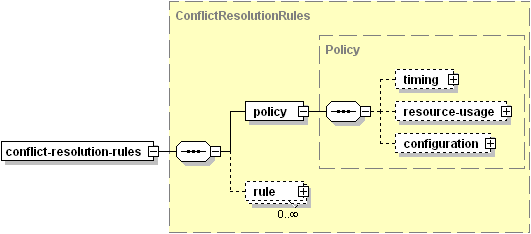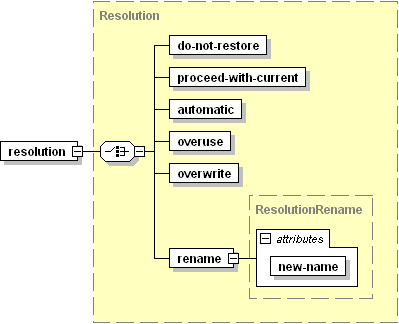The file should be structured as follows.

-
conflict-resolution-rules
Required, document root element. policy- Required, contains the policies descriptions. Children, if present,
must be placed in the order shown on the scheme.-
timing
Optional, contains description of policy on resolving timing
conflicts. See the structure below.
Must be present in the document if a timing policy should be
used during the restore.
May not be present in the document if no policy required for
timing conflicts. -
resource-usage
Optional, contains description of policy on resolving resource
usage conflicts. See the structure below.
Must be present in the document if a resource usage policy
should be used during the restore.
May not be present in the document if no policy required for
resource usage conflicts. -
configuration
Optional, contains description of policy on resolving
configuration conflicts. See the structure below.
Must be present in the document if a configuration policy should
be used during the restore.
May not be present in the document if no policy required for
configuration conflicts.
-
-
rule
Optional, contains the rule descriptions. For details on the node
structure, refer to the Resolutions Description Format: Rules
section.
The policy elements have the same structure:



-
resolutionRequired, contains a definition of conflict resolution. Structured
as follows:
The resolution element must not be empty, it is required that it
contains one, and only one of its children elements:
-
do-not-restore
Sets the Do Not Restore resolution, empty value. -
proceed-with-current
Sets the Proceed With Current resolution, empty value. -
automatic
Sets the Automatic resolution, empty value. -
overuse
Sets the Overuse resolution, empty value. -
overwrite
Sets the Overwrite resolution, empty value. -
rename
Sets the Rename resolution, empty value.-
new-name
Required, makes sense only if defined for configuration conflicts.
Specifies a name of new configuration that should be assigned to
all conflict objects. The value must be a string.
-